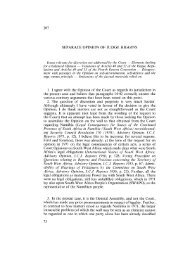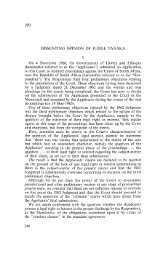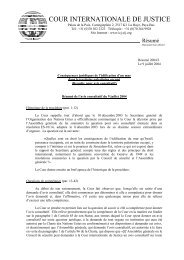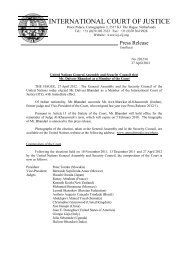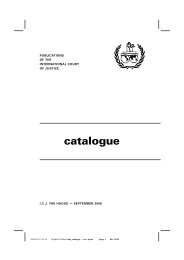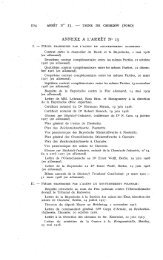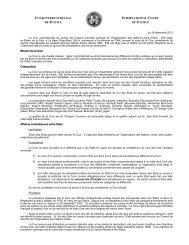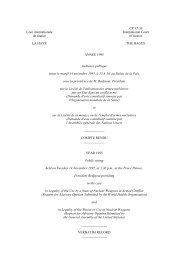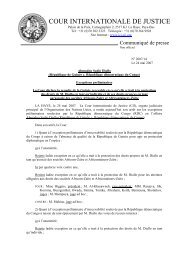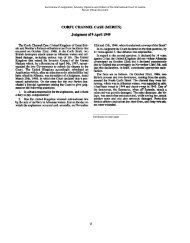International Court of Justice - Cour international de Justice
International Court of Justice - Cour international de Justice
International Court of Justice - Cour international de Justice
Create successful ePaper yourself
Turn your PDF publications into a flip-book with our unique Google optimized e-Paper software.
COUR INTERNATIONALE<br />
DE JUSTICE<br />
INTERNATIONAL COURT<br />
OF JUSTICE<br />
18 December 2013<br />
The <strong>International</strong> <strong><strong>Cour</strong>t</strong> <strong>of</strong> <strong>Justice</strong> is the principal judicial organ <strong>of</strong> the United Nations. Its seat is at the Peace Palace in<br />
The Hague (Netherlands). It began work in 1946, when it replaced the Permanent <strong><strong>Cour</strong>t</strong> <strong>of</strong> <strong>International</strong> <strong>Justice</strong> which had<br />
functioned in the Peace Palace since 1922. It operates un<strong>de</strong>r a Statute largely similar to that <strong>of</strong> its pre<strong>de</strong>cessor, which is an integral<br />
part <strong>of</strong> the Charter <strong>of</strong> the United Nations.<br />
Functions <strong>of</strong> the <strong><strong>Cour</strong>t</strong><br />
The <strong><strong>Cour</strong>t</strong> has a dual role: to settle in accordance with <strong>international</strong> law the legal disputes submitted to it by States, and to<br />
give advisory opinions on legal questions referred to it by duly authorized <strong>international</strong> organs and agencies.<br />
Composition<br />
The <strong><strong>Cour</strong>t</strong> is composed <strong>of</strong> 15 judges elected to nine-year terms <strong>of</strong> <strong>of</strong>fice by the United Nations General Assembly and<br />
Security Council sitting in<strong>de</strong>pen<strong>de</strong>ntly <strong>of</strong> each other. It may not inclu<strong>de</strong> more than one judge <strong>of</strong> any nationality. Elections are held<br />
every three years for one-third <strong>of</strong> the seats, and retiring judges may be re-elected. The Members <strong>of</strong> the <strong><strong>Cour</strong>t</strong> do not represent their<br />
governments but are in<strong>de</strong>pen<strong>de</strong>nt magistrates.<br />
The judges must possess the qualifications required in their respective countries for appointment to the highest judicial<br />
<strong>of</strong>fices, or be jurists <strong>of</strong> recognized competence in <strong>international</strong> law. The composition <strong>of</strong> the <strong><strong>Cour</strong>t</strong> has also to reflect the main forms<br />
<strong>of</strong> civilization and the principal legal systems <strong>of</strong> the world.<br />
When the <strong><strong>Cour</strong>t</strong> does not inclu<strong>de</strong> a judge possessing the nationality <strong>of</strong> a State party to a case, that State may appoint a<br />
person to sit as a judge ad hoc for the purpose <strong>of</strong> the case.<br />
The present composition <strong>of</strong> the <strong><strong>Cour</strong>t</strong> is as follows: Presi<strong>de</strong>nt Peter Tomka (Slovakia); Vice-Presi<strong>de</strong>nt Bernardo<br />
Sepúlveda-Amor (Mexico); Judges Hisashi Owada (Japan); Ronny Abraham (France); Kenneth Keith (New Zealand);<br />
Mohamed Bennouna (Morocco); Leonid Skotnikov (Russian Fe<strong>de</strong>ration); Antônio A. Cançado Trinda<strong>de</strong> (Brazil); Abdulqawi A.<br />
Yusuf (Somalia), Christopher Greenwood (United Kingdom), Xue Hanqin (China), Joan E. Donoghue (United States <strong>of</strong> America),<br />
Giorgio Gaja (Italy), Julia Sebutin<strong>de</strong> (Uganda) and Dalveer Bhandari (India).<br />
The Registrar <strong>of</strong> the <strong><strong>Cour</strong>t</strong> is Mr. Philippe Couvreur, <strong>of</strong> Belgian nationality, and the Deputy-Registrar is Mr. Jean-Pelé<br />
Fomété, <strong>of</strong> Cameroonian nationality.<br />
Contentious cases between States<br />
The Parties<br />
Only States may apply to and appear before the <strong><strong>Cour</strong>t</strong>. The Member States <strong>of</strong> the United Nations (at present<br />
numbering 193) are so entitled.<br />
Jurisdiction<br />
The <strong><strong>Cour</strong>t</strong> is competent to entertain a dispute only if the States concerned have accepted its jurisdiction in one or more <strong>of</strong> the<br />
following ways:<br />
(1) by the conclusion between them <strong>of</strong> a special agreement to submit the dispute to the <strong><strong>Cour</strong>t</strong>;<br />
(2) by virtue <strong>of</strong> a jurisdictional clause, i.e., typically, when they are parties to a treaty containing a provision<br />
whereby, in the event <strong>of</strong> a disagreement over its interpretation or application, one <strong>of</strong> them may refer the<br />
dispute to the <strong><strong>Cour</strong>t</strong>. Over 300 treaties or conventions contain a clause to such effect;<br />
(3) through the reciprocal effect <strong>of</strong> <strong>de</strong>clarations ma<strong>de</strong> by them un<strong>de</strong>r the Statute whereby each has accepted the<br />
jurisdiction <strong>of</strong> the <strong><strong>Cour</strong>t</strong> as compulsory in the event <strong>of</strong> a dispute with another State having ma<strong>de</strong> a similar<br />
<strong>de</strong>claration. The <strong>de</strong>clarations <strong>of</strong> 70 States are at present in force, a number <strong>of</strong> them having been ma<strong>de</strong><br />
subject to the exclusion <strong>of</strong> certain categories <strong>of</strong> dispute.<br />
In cases <strong>of</strong> doubt as to whether the <strong><strong>Cour</strong>t</strong> has jurisdiction, it is the <strong><strong>Cour</strong>t</strong> itself which <strong>de</strong>ci<strong>de</strong>s.<br />
Procedure<br />
The procedure followed by the <strong><strong>Cour</strong>t</strong> in contentious cases is <strong>de</strong>fined in its Statute, and in the Rules <strong>of</strong> <strong><strong>Cour</strong>t</strong> adopted un<strong>de</strong>r<br />
the Statute. The Rules date from 1978 and certain provisions have since been amen<strong>de</strong>d (the latest amendment entered into force<br />
on 29 September 2005). The proceedings inclu<strong>de</strong> a written phase, in which the parties file and exchange pleadings, and an oral<br />
phase consisting <strong>of</strong> public hearings at which agents and counsels address the <strong><strong>Cour</strong>t</strong>. As the <strong><strong>Cour</strong>t</strong> has two <strong>of</strong>ficial languages<br />
(English and French) everything written or said in one language is translated into the other.<br />
After the oral proceedings the <strong><strong>Cour</strong>t</strong> <strong>de</strong>liberates in camera and then <strong>de</strong>livers its judgment at a public sitting. The judgment is<br />
final and without appeal. Should one <strong>of</strong> the States involved fail to comply with it, the other party may have recourse to the Security<br />
Council <strong>of</strong> the United Nations.
The <strong><strong>Cour</strong>t</strong> discharges its duties as a full court but, at the request <strong>of</strong> the parties, it may also establish ad hoc chambers to<br />
<strong>de</strong>al with particular cases (six cases have been <strong>de</strong>alt with by such chambers since 1946). A Chamber <strong>of</strong> Summary Procedure is<br />
further elected every year by the <strong><strong>Cour</strong>t</strong> in accordance with its Statute.<br />
Since 1946 the <strong><strong>Cour</strong>t</strong> has <strong>de</strong>livered 114 Judgments on disputes concerning inter alia land frontiers, maritime<br />
boundaries, territorial sovereignty, the non-use <strong>of</strong> force, violation <strong>of</strong> <strong>international</strong> humanitarian law, non-interference in the<br />
internal affairs <strong>of</strong> States, diplomatic relations, hostage-taking, the right <strong>of</strong> asylum, nationality, guardianship, rights <strong>of</strong> passage<br />
and economic rights.<br />
Sources <strong>of</strong> applicable law<br />
The <strong><strong>Cour</strong>t</strong> <strong>de</strong>ci<strong>de</strong>s in accordance with <strong>international</strong> treaties and conventions in force, <strong>international</strong> custom, the general<br />
principles <strong>of</strong> law and, as subsidiary means, judicial <strong>de</strong>cisions and the teachings <strong>of</strong> the most highly qualified publicists.<br />
Advisory Opinions<br />
The advisory procedure <strong>of</strong> the <strong><strong>Cour</strong>t</strong> is open solely to <strong>international</strong> organizations. The only bodies at present authorized to<br />
request advisory opinions <strong>of</strong> the <strong><strong>Cour</strong>t</strong> are five organs <strong>of</strong> the United Nations and 16 agencies <strong>of</strong> the United Nations family.<br />
On receiving a request, the <strong><strong>Cour</strong>t</strong> <strong>de</strong>ci<strong>de</strong>s which States and organizations might provi<strong>de</strong> useful information and gives them<br />
an opportunity <strong>of</strong> presenting written or oral statements. The <strong><strong>Cour</strong>t</strong>’s advisory procedure is otherwise mo<strong>de</strong>lled on that for<br />
contentious proceedings, and the sources <strong>of</strong> applicable law are the same. In principle the <strong><strong>Cour</strong>t</strong>’s advisory opinions are consultative<br />
in character and are therefore not binding as such on the requesting bodies. Certain instruments or regulations can, however,<br />
provi<strong>de</strong> in advance that the advisory opinion shall be binding.<br />
Since 1946 the <strong><strong>Cour</strong>t</strong> has given 27 Advisory Opinions, concerning inter alia the accordance with <strong>International</strong> law <strong>of</strong> the<br />
unilateral <strong>de</strong>claration <strong>of</strong> in<strong>de</strong>pen<strong>de</strong>nce in respect <strong>of</strong> Kosovo, legal consequences <strong>of</strong> the construction <strong>of</strong> a wall in the occupied<br />
Palestinian territory, admission to United Nations membership, reparation for injuries suffered in the service <strong>of</strong> the United Nations,<br />
territorial status <strong>of</strong> South-West Africa (Namibia) and Western Sahara, judgments ren<strong>de</strong>red by <strong>international</strong> administrative tribunals,<br />
expenses <strong>of</strong> certain United Nations operations, applicability <strong>of</strong> the United Nations Headquarters Agreement, the status <strong>of</strong> human<br />
rights rapporteurs, and the legality <strong>of</strong> the threat or use <strong>of</strong> nuclear weapons.<br />
Pending cases<br />
Eleven (11) cases are currently pending:<br />
1. Gabčíkovo-Nagymaros Project (Hungary/Slovakia)<br />
2. Armed Activities on the Territory <strong>of</strong> the Congo (Democratic Republic <strong>of</strong> Congo v. Uganda)<br />
3. Application <strong>of</strong> the Convention on the Prevention and Punishment <strong>of</strong> the Crime <strong>of</strong> Genoci<strong>de</strong> (Croatia v. Serbia)<br />
4. Maritime Dispute (Peru v. Chile)<br />
5. Whaling in the Antarctic (Australia v. Japan: New Zealand intervening)<br />
6. Certain Activities carried out by Nicaragua in the Bor<strong>de</strong>r Area (Costa Rica v. Nicaragua)<br />
7. Construction <strong>of</strong> a Road in Costa Rica along the San Juan River (Nicaragua v. Costa Rica)<br />
8. Obligation to negotiate access to the Pacific Ocean (Bolivia v. Chile)<br />
9. Question <strong>of</strong> the Delimitation <strong>of</strong> the Continental Shelf between Nicaragua and Colombia beyond 200 nautical miles<br />
from the Nicaraguan Coast (Nicaragua v. Colombia)<br />
10. Proceedings instituted by Nicaragua against Colombia on 26 November 2013<br />
11. Proceedings instituted by Timor-Leste against Australia<br />
Information Department:<br />
Mr. Andrey Poskakukhin, First Secretary <strong>of</strong> the <strong><strong>Cour</strong>t</strong>, Head <strong>of</strong> Department (+31 (0)70 302 2336)<br />
Mr. Boris Heim, Information Officer (+31 (0)70 302 2337)<br />
Ms Joanne Moore, Associate Information Officer (+31 (0)70 302 2394)<br />
Ms Genoveva Madurga, Administrative Assistant (+31 (0)70 302 2396)<br />
Website <strong>of</strong> the <strong><strong>Cour</strong>t</strong>: www.icj-cij.org



